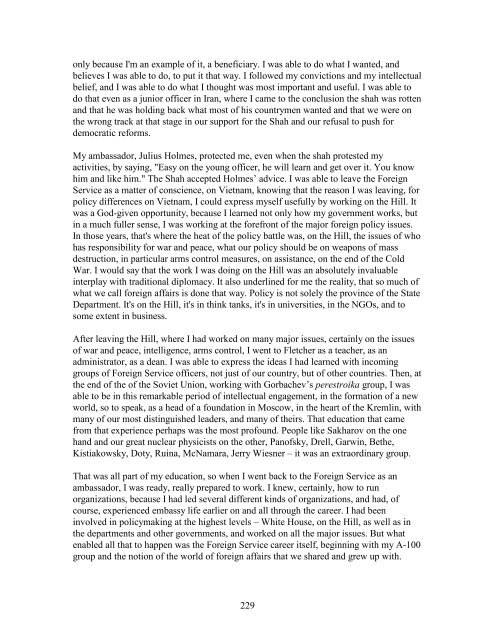1 The Association for Diplomatic Studies and Training Foreign ...
1 The Association for Diplomatic Studies and Training Foreign ...
1 The Association for Diplomatic Studies and Training Foreign ...
You also want an ePaper? Increase the reach of your titles
YUMPU automatically turns print PDFs into web optimized ePapers that Google loves.
only because I'm an example of it, a beneficiary. I was able to do what I wanted, <strong>and</strong><br />
believes I was able to do, to put it that way. I followed my convictions <strong>and</strong> my intellectual<br />
belief, <strong>and</strong> I was able to do what I thought was most important <strong>and</strong> useful. I was able to<br />
do that even as a junior officer in Iran, where I came to the conclusion the shah was rotten<br />
<strong>and</strong> that he was holding back what most of his countrymen wanted <strong>and</strong> that we were on<br />
the wrong track at that stage in our support <strong>for</strong> the Shah <strong>and</strong> our refusal to push <strong>for</strong><br />
democratic re<strong>for</strong>ms.<br />
My ambassador, Julius Holmes, protected me, even when the shah protested my<br />
activities, by saying, "Easy on the young officer, he will learn <strong>and</strong> get over it. You know<br />
him <strong>and</strong> like him." <strong>The</strong> Shah accepted Holmes’ advice. I was able to leave the <strong>Foreign</strong><br />
Service as a matter of conscience, on Vietnam, knowing that the reason I was leaving, <strong>for</strong><br />
policy differences on Vietnam, I could express myself usefully by working on the Hill. It<br />
was a God-given opportunity, because I learned not only how my government works, but<br />
in a much fuller sense, I was working at the <strong>for</strong>efront of the major <strong>for</strong>eign policy issues.<br />
In those years, that's where the heat of the policy battle was, on the Hill, the issues of who<br />
has responsibility <strong>for</strong> war <strong>and</strong> peace, what our policy should be on weapons of mass<br />
destruction, in particular arms control measures, on assistance, on the end of the Cold<br />
War. I would say that the work I was doing on the Hill was an absolutely invaluable<br />
interplay with traditional diplomacy. It also underlined <strong>for</strong> me the reality, that so much of<br />
what we call <strong>for</strong>eign affairs is done that way. Policy is not solely the province of the State<br />
Department. It's on the Hill, it's in think tanks, it's in universities, in the NGOs, <strong>and</strong> to<br />
some extent in business.<br />
After leaving the Hill, where I had worked on many major issues, certainly on the issues<br />
of war <strong>and</strong> peace, intelligence, arms control, I went to Fletcher as a teacher, as an<br />
administrator, as a dean. I was able to express the ideas I had learned with incoming<br />
groups of <strong>Foreign</strong> Service officers, not just of our country, but of other countries. <strong>The</strong>n, at<br />
the end of the of the Soviet Union, working with Gorbachev’s perestroika group, I was<br />
able to be in this remarkable period of intellectual engagement, in the <strong>for</strong>mation of a new<br />
world, so to speak, as a head of a foundation in Moscow, in the heart of the Kremlin, with<br />
many of our most distinguished leaders, <strong>and</strong> many of theirs. That education that came<br />
from that experience perhaps was the most profound. People like Sakharov on the one<br />
h<strong>and</strong> <strong>and</strong> our great nuclear physicists on the other, Panofsky, Drell, Garwin, Bethe,<br />
Kistiakowsky, Doty, Ruina, McNamara, Jerry Wiesner – it was an extraordinary group.<br />
That was all part of my education, so when I went back to the <strong>Foreign</strong> Service as an<br />
ambassador, I was ready, really prepared to work. I knew, certainly, how to run<br />
organizations, because I had led several different kinds of organizations, <strong>and</strong> had, of<br />
course, experienced embassy life earlier on <strong>and</strong> all through the career. I had been<br />
involved in policymaking at the highest levels – White House, on the Hill, as well as in<br />
the departments <strong>and</strong> other governments, <strong>and</strong> worked on all the major issues. But what<br />
enabled all that to happen was the <strong>Foreign</strong> Service career itself, beginning with my A-100<br />
group <strong>and</strong> the notion of the world of <strong>for</strong>eign affairs that we shared <strong>and</strong> grew up with.<br />
229
















